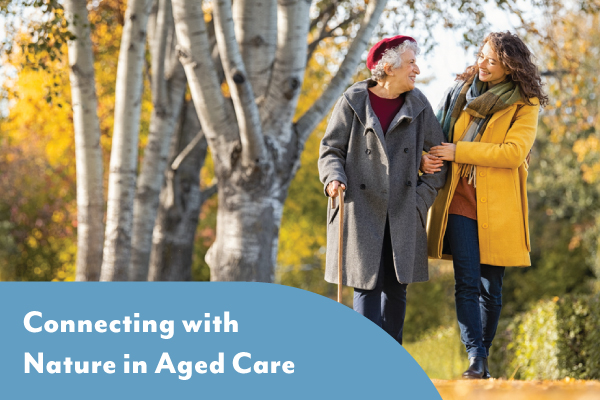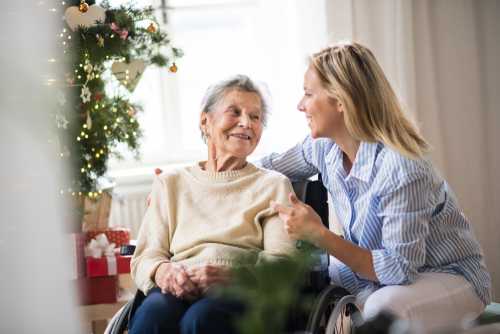Digital technology is now very much a part of everyday living. It’s important for elderly people to embrace technology and use it safely, knowing that it provides many wonderful opportunities to lead a healthy, happy life.

Digital awareness among the elderly
Technology influences every aspect of life. The rapid rate of advancement over the past 50 years has brought us things like computers, smartphones and the internet, connecting us in ways we never dreamed of.
While many see this as a positive development, some elderly people may be reluctant to embrace digital technologies. They might feel as though technology has advanced too quickly for them and worry about not knowing how to use it. They may even see the internet as dangerous.
Since the pandemic, digital technology has become increasingly important in aged care settings. Empowering elderly people to embrace technology in safe and productive ways is now an essential part of care.
Encouraging independence
Doing things online can make life a lot easier. Nowadays you can do almost anything from the comfort of your couch, from banking to shopping to streaming your favourite shows.
While most elderly people know these services exist, they might not know how to access or use them. Showing elderly people where to find online services, navigate sites and download useful apps can help them feel capable and increase independence.
Battling loneliness

Loneliness is a huge concern for our ageing population. Getting older can unfortunately make it difficult for individuals to stay connected with loved ones, participate in community and enjoy the social life they once had. For some elderly people, their carers might be the only people they’ve seen in weeks.
Luckily, digital technology can do a lot to alleviate loneliness. Text messages, video calls and email can enable elderly individuals to connect with family and friends with the touch of a button. Social media can provide a forum for them to participate in broader communities. Sharing photos of the children, grandkids and pets is easy – elderly people no longer need to wait for a framed photograph to see what their loved ones have been up to.
Aged carers can assist their elderly clients to use these technologies in convenient and positive ways. It might be as simple as showing them how to use FaceTime or changing the accessibility settings on their phone.
Improving health and wellbeing
Digital technology might not be the first thing we think of when considering elderly people’s health and wellbeing, but it provides a wealth of benefits.
Wearable devices like fitness bands and health monitors can track mobility, blood pressure and various health conditions.
Streaming services provide entertainment, and most platforms now include a ‘classic movies’ section where people can revisit their old favourites.
News apps enable elderly individuals to keep abreast of current affairs, empowering them with knowledge and helping them feel connected to the world at large.
Devices like smartphones and tablets are tools which can be used to improve accessibility to services. Something as simple as increasing the text size on their screen may give someone the courage and assistance they need to keep doing things for themselves.
Helping elderly people stay safe online
That being said, some elderly people may be concerned for their online security. This is not a baseless fear – as we know, the internet can sometimes be dangerous. It’s always good practice to take safety precautions.
Online scams
Elderly people and their carers should be vigilant about online scams, many of which target seniors and people living on their own. Encourage individuals to keep an eye out for fake accounts and suspicious requests, especially if they’re asking for credit card details.
Security settings
Aged care workers should address their elderly clients’ security concerns and explain how to take precautions, such as adjusting the security settings on their devices.
Protecting their privacy
Communicating and participating in online communities can impact people’s privacy. Explaining privacy settings and good internet hygiene is something aged care workers can do to help older persons use digital communications safely.
Misinformation
Working out what’s true and what’s fake on the internet is difficult for any age group, but maybe even more so for seniors. Elderly people generally have less contact with the broader community and may be less engaged with current affairs. For those who are less internet ‘savvy’, recognising misinformation when they see it can be challenging.
A good idea is to point elderly people in the direction of accredited news services. Carers can also help interpret information.
Some elderly people struggle with cognitive decline. In these cases, studies have shown that empowering elderly minds to navigate technology and busting myths about technological incompetence can be really helpful.
Ageing well in the digital era

Ageing with dignity is one of the pillars of aged care, and embracing digital technologies can improve the health and happiness of elderly people provided it’s done safely.
Being patient, listening to their concerns and explaining new things in a light and friendly tone are all positive ways to improve technological engagement among the elderly. As always, it comes down to the relationship aged care workers build with their clients.
At Selmar we make people-focused care a priority. If you’re interested in learning more, we have the courses for you.




